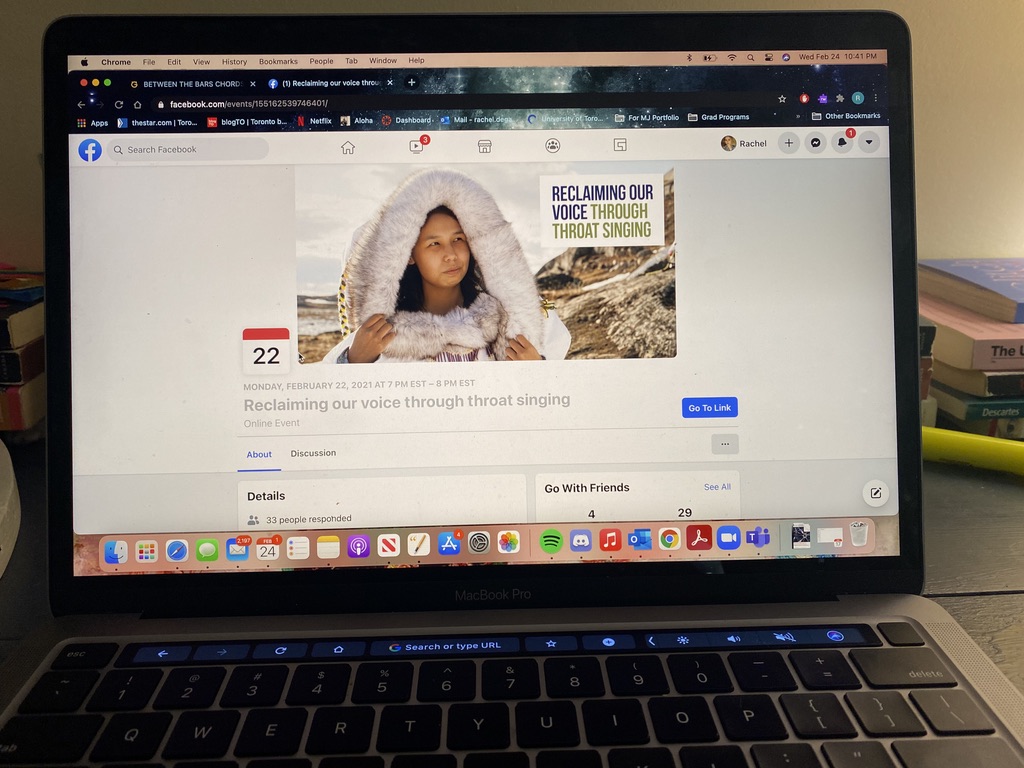The University of Toronto Spirit Singers is an open choir at U of T that hosts Social Justice Music Workshops, which are drop-in sessions that are held on Monday evenings. The group welcomes members from all faith-based backgrounds including non-spiritual traditions, and is dedicated to exploring interfaith understandings of peace and justice through music from different cultures. This week was hosted by Raigelee Alorut, an Inuit grandmother from Iqaluit, who taught the group the history, tradition, and technique of throat-singing in Inuit culture.
Alorut is a U of T alumni, and referenced her Masters thesis to guide the discussion: asking the difficult question of how her family can deal with reconciliation when it entails working with the government that destroyed their future. She elaborated on this by describing the many ways the Canadian government and European missionaries shattered the cultural traditions of the Inuit people, which has left lasting effects on her community in Iqaluit. Alorut described how missionaries painted them as wicked for not following Christian religions, devaluing the spiritual connections that the Inuit held because they were not founded on Eurocentric beliefs. Instead, missionaries used the Bible to convert the Inuit and rid them of their spirituality.
Alorut's community was not only asked to assimilate, but was also forced to relocate by the Canadian government—which was sadly common for many Indigenous nations throughout North America. This made it even more difficult for the Inuit to sustain themselves, because they were forcibly moved to remote areas with no access to hospitals or doctors while tuberculosis ravaged their communities.
Alorut stated that it was not formal education that kept her family alive. Instead, the Elders were taught informally, through tradition and nature, which helped many of them survive the cancerous environment cultivated by the Canadian government. The harmfull environment included colonial practices such as relocation, assimilation, and the residential school system — all of which were used as tools to carry out cultural and physical genocide, which have traumatized Indigenous people across generations. The residential school system was specifically used for the erasure of Indigenous languages, customs, and stories, as children were forced to move away from their famil. Alorut noted that Elders who were effected by the residential school system, or by relocation processes, often choose not to talk about it, mainly because of the pain it evokes.
In her discussion, Alorut focused specifically on throat singing and drum dancing, which were banned by Canadian colonial policies. She emphasized that, for the Inuit, they lost everything due to colonization. However, today, she continues to practice and teach these traditions with the hopes that they can live on. Afterwards, Alorut instructed the group in a throat singing session, telling the audience what sounds to pronounce and how to focus, inhale, and exhale your breath during song. Although her instructions began easy, I was quickly shocked by how difficult it became to keep up when more sounds and techniques were integrated and when her singing sped up. Despite only doing it for two minutes, my voice felt strained and it was obvious to myself (my mic was off) that I was doing it wrong. Alorut, in contrast, could throat sing with speed, skill, and intentionality.
When asked by an event attendee whether it would be considered cultural appropriation to teach or practice throat singing as a settler, Alorut responded that the answer varies depending on who you talk to. She stated that the tradition is Inuit, and so some Inuit people may believe that settlers practicing, and especially teaching, throat singing would feel like Canadians, once again, stealing and/or distorting an Inuit tradition. Regardless, Alorut maintained that it is important to respect the tradition itself, and to learn its history, especially considering Canada’s many attempts to destroy these practices. Although I was quite terrible at it, I’m grateful that I had the opportunity to learn from Alorut.
The Social Justice Music Workshops take place on Mondays from 7:00pm to 8:00pm, and I highly recommend registering if you’re interested in learning about other cultural and faith-related traditions that involve music and song. The event, and other events like it, can be found on the Multi-Faith Centre calendar. The link is below:

0 comments on “Social Justice Music Workshop: “Reclaiming our Voice Through Throat Singing””